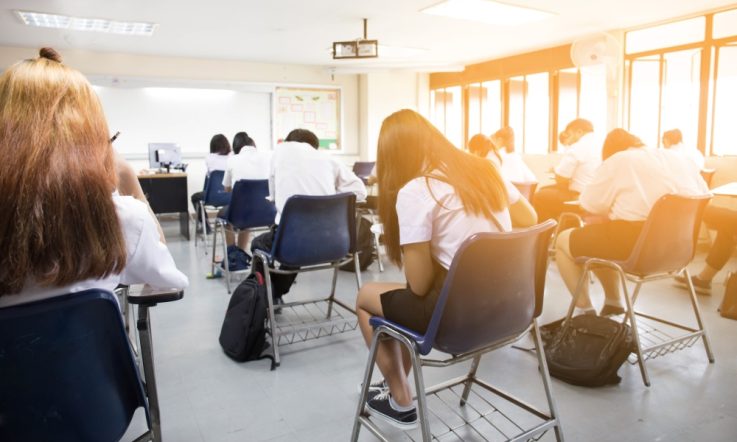Before we get into this episode, are you subscribed yet to the free weekly Teacher bulletin? Get a weekly wrap of our latest content straight to your inbox. Join our community by clicking on the sign-up button at our website, teachermagazine.com.
Thanks for tuning in to this episode of Teacher Staffroom, where we catch you up on the latest evidence, insight, and action in education. I'm Dominique Russell.
As a school leader, what’s been your biggest achievement of the last month? What about a challenge or a hurdle you’ve had to overcome? And what’s been a key learning for you in your own practice? These are the questions we ask our principal guest in our podcast series, School Assembly. If you haven’t listened before, School Assembly is the podcast where we explore what it takes to build a school from the ground up. We’re in Series 3 now and for the next year, we’ll be following Foundation Principal Dan McShea at the new P-12 Notre Dame College on the Sunshine Coast in Queensland.
I’ll introduce you to Dan in this episode in case you missed it, and we’ll also take a look at some other new school leadership stories. Don’t forget, like all episodes of Teacher Staffroom, I’ll be posing some questions throughout this podcast, so feel free to pause the audio as you go, gather some colleagues, and discuss together how these stories might be relevant to your school context. Let's get started.
We know that school leadership is a complex and demanding role. In a recent article, we reported that, according to new research, applying for grants is now a major part of a principal’s role. Academics from Deakin University and the Australian Catholic University interviewed 18 principals from government schools in Victoria, Queensland, New South Wales and the Northern Territory between July and November last year and they included many quotes from these interviews in their paper. For example, here’s what one principal of a primary school with an advantaged student cohort said about applying for grants:
My biggest issue at the moment is realistically … we are still underfunded. … I do see [grant writing] as part and parcel of my job, because at the end of the day it benefits the children and the teachers at the school.
Crucially, the paper also said ‘… the competitive applications increased and intensified principals’ workload, as interviewees were investing considerable personal and professional time to applications, and the majority of principals felt this detracted from their core work as school principal.’
So, if you’re a school leader listening to this episode, does that interview quote resonate with your experience at all? Have competitive grant applications increased and intensified your workload as a leader?
Another research paper looking at the insights of school leaders was also published recently. This time the focus was on exploring teacher readiness, attributes and qualities, through the lens of leaders in hard-to-staff schools. So, certainly a relevant issue at the moment. Seventeen principals were interviewed for this study, and we spoke to lead author, Dr Babak Dadvand from La Trobe University, about the findings. Here’s what he told us:
Schools often serve communities that have unique strengths but also face specific challenges, such as geographic isolation or historic disadvantages … We were surprised by the extent to which leaders emphasised the importance of contextual factors in determining teacher readiness.
More broadly, 4 key themes were uncovered through the interviews. They are: knowing the community; care and responsibility; adaptability and willingness to learn; and teamwork and collaboration. On the first theme of knowing the community, here is what one principal from a regional school shared:
The reality is that when you get into a school and you’ve got 20 or so students to manage, that curriculum knowledge is so secondary to the skills that have to be in place so that the children have someone who supports them, someone who co-regulates them, makes them feel safe, and if you’ve got this in place then you can meet them at their point of need.
The report also made some recommendations, albeit keeping in mind the small-scale nature of the research. These included community-centred professional placements; involvement in community-based, education-related projects; closer collaboration between university- and school-based mentors; and greater leveraging of ICT in the mentoring process.
Considering these recommendations, reflect on your experience of teacher readiness in your school context. How important are those 4 key themes of knowing the community, care and responsibility, adaptability and willingness to learn, and teamwork and collaboration? How can you utilise mentoring to support new staff in these areas?
Coming up after the break, I’ll introduce you to our Series 3 principal for School Assembly, Dan McShea.
If you’re enjoying the Teacher podcast channel, have you subscribed yet to the free Teacher bulletin? It’s the best way to get our latest stories straight to your inbox. In addition to a weekly wrap up of our latest content, subscribers to the bulletin can receive Teacher Trending, where we share our top 5 pieces of content on a trending topic, and special editions where we share a bonus piece of content with you. The sign-up process is easy – just visit our website, teachermagazine.com and click on the sign-up button on the righthand side of our homepage.
So, as you now know, we’re in Series 3 of our School Assembly podcast series. In Series 1 we followed Principal Ray Boyd and Associate Principal Rachael Lehr at Dayton Primary School in Perth, Western Australia. In Series 2 we followed Principal Jo Camozzato at the dual campus Bemin Secondary College in Melbourne, Victoria and in Series 3 we’re in Queensland with Dan McShea.
In this first episode Dan introduced us to Notre Dame College, which is set to open to students in prep to year 3 and year 7 in 2025. It’s a prep to year 12 Brisbane Catholic Education College in the Marist tradition and they will ultimately serve around 1,850 students – so, a really big school. In the episode, we asked Dan about what staffing is looking like currently, what drew him to this new role, and also how he’s going about fostering strong relationships with the community.
And, as I’ve mentioned, we’re going to be asking Dan about his proudest achievement, biggest challenge and key learning at the end of each monthly episode. For this first episode, here’s what Dan had to say about his key learning:
Yeah. Well, I guess you know, this is such a unique year and I'm sure that anyone who's been on that journey would attest to that. But the work is so seasonal and really shifts even as every new role comes on, your attention turns to somewhere else that you need to be. And my key learning has been just to focus on what really matters at the time and you know you could apply that to a few layers of your life I guess – your wellbeing and your work and what's in front of you, and getting things done while you can. So that's been my response to that.
So, after hearing about Dan’s – what is your key learning from the past month? How will this change the way you work in the future?
Dan also spoke about the importance of relationships in this first episode, which we know is a key for school leaders. On this topic, we recently published a new instalment in our Teacher’s Bookshelf series. In case you’re unfamiliar, in our Teacher’s Bookshelf series, we share an extract from a professional learning text, and in this particular instalment we shared an exclusive extract from a new text by educational leader and doctoral student, Matt Pitman. It’s titled The Connection Curriculum: Igniting Positive Change in Schools Through Sustainable Curriculum and our extract focuses on the first chapter titled, The connection journey. Here’s a little snippet:
Schools must shift to developing a focus on assisting young people to know themselves outside of the measurable qualities a degree or a career may require. Educators are spending more and more time building relationships and attempting to learn about their students and … this holds immense value at the beginning of the connection journey.
The question is this, however, do we, in education, push the students to get to know who they are, what drives them and what they value beyond what feeds the prescribed curriculum or to a depth beyond the superficial? Do we genuinely collect this information for the student to utilise personally or is its primary value in narrowing course selection and pathways options?
So, that brings me to one last question for you to reflect on. As an educator, when was the last time you spoke to students about who they are, what drives them and what they value (beyond the requirements of school)?
And finally, if you’ve been following along with the 2024 Teacher Awards, I wanted to let you know that the 2024 shortlist has been announced. We’re so delighted to shortlist 25 nominations from 5 states in Australia across our 8 Award categories. They will now progress to the next and final round of judging. The winners will be announced in September, so keep an eye out for that. If you’d like to see who made our shortlist for 2024, you can find the article at our website, teachermagazine.com.
That’s all for this episode. Thanks for listening. You’re now all caught up on the latest evidence, insight and action. I’ll leave all the links to the full articles and podcast episodes I mentioned today in the transcript of this podcast episode, which you can find under the podcast tab at our website.
Before you go, are you currently subscribed to the weekly Teacher bulletin? It’s a free weekly wrap of our latest content straight to your inbox. Join the more than 40,000 educators who are already part of the community by clicking on the sign-up button at our website, teachermagazine.com.



